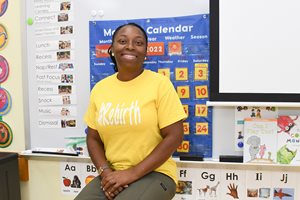
MEKESHA PAYTON.
Mekesha Payton oversees a classroom of two-year-olds at Wor-Wic’s on-campus child development center.
Across Maryland, there are widespread vacancies in teaching positions, especially in early childhood, elementary and special education, according to a 2022 Maryland Department of Education report. Wor-Wic Community College is working to help the Lower Shore meet this critical need.
“As Maryland works to increase diversity and the number of teachers in the education profession, community colleges such as Wor-Wic play an essential role in building the teacher pipeline,” said Dr. Dwayne Abt, Worcester County Public Schools’ chief operations and human relations officer. “Unlike traditional teacher programs at four-year colleges and universities, Wor-Wic serves a more diverse population of students that can access beginning teacher programs at a lower cost. Worcester County Public Schools looks forward to welcoming new teacher recruits in the future who got their start at Wor-Wic.”
Students can enter the educational workforce in multiple ways via Wor-Wic. Non-credit courses offer certification for people preparing to work in child care centers. Associate degree programs are offered in early childhood, elementary and secondary education, with options for transfer into bachelor’s degree programs.
“We provide many ways for future educators to gain the skills needed to teach and grow our youth,” said Dr. Andria Kallarakal, human services department head and associate professor of social science. “We partner with local schools, day cares and universities to ensure a good start for child care workers and a simple transfer process for those working on four-year degrees.”
An associate degree in education is a good place to start not only a college path, but a career as well. Wor-Wic’s own child development center boasts two graduates: Tonya Thornton-Davis and Mekesha Payton.
Thornton-Davis said her work is rewarding. She said parents of children who have been through her classes give her updates about how their youngsters are thriving in school thanks to the start she gave them.
“It’s a calling — you have to love them and want to teach them,” she said.
Thornton-Davis knows the importance of that care firsthand, as someone who didn’t receive it. “I was abused as a child, so my grandparents raised me,” she said. “It gave me a heart for children. I love them and they melt my heart.”
She said she appreciated the encouragement and help she received from Wor-Wic — not only in academics, but in the resources and support she needed to succeed. “Wor-Wic was like a family,” she said.
Thornton-Davis went on to earn a bachelor’s degree from the University of Maryland Eastern Shore and is studying for the PRAXIS exam to become a certified teacher, something she would like to use in Wor-Wic’s new prekindergarten program. To aspiring teachers, she says: “Be sure your heart is in it. If you genuinely love children, it’s the best job you’ll ever have.”
Her colleague, Payton, said she always liked working with children, from teaching Sunday school to watching her friends’ kids. She started her studies in 2001, but having her own children delayed her plans. She came back in 2016. “After being out of school, it was a challenge,” she said. “But as a Wor-Wic student, I appreciated the help from my math mentor. She stuck with me.”
It was all worth it: Payton holds a level five credential from the Maryland State Department of Education and teaches two-year-olds at the child development center. “My favorite part is seeing the kids develop as they progress socially and emotionally.”
Going straight into the classroom isn’t a must — transfer to a four-year program is also an option. Georgia Phillips received her associate degree in Wor-Wic’s elementary education transfer program in 2021. This fall was her last semester at Salisbury University (SU).
Phillips explained, “I knew I could get two years of school under my belt paying much less than I would at a four-year college. I also wanted to start at a community college rather than a big university because there might be more people my age — I was 26.”
“Wor-Wic taught me how to write college-level papers, use correct citation and gave me tools for studying that I am still using. Wor-Wic also taught me how to collaborate with my peers through discussions and group assignments, which I must do a lot in SU’s teaching program.” Phillips hopes to work at an elementary school in Worcester County when she graduates.